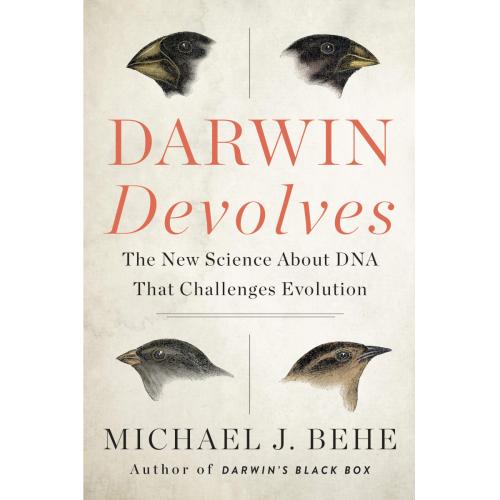Darwin Devolves
Michael J. Behe. 2019. HarperOne. ISBN-13: 978-0062842619

Michael J. Behe. 2019. HarperOne. ISBN-13: 978-0062842619

In Darwin Devolves, Behe adds new evidence that Darwinian processes are not capable of the kind of creative building required for Darwinian theory. Three points seem especially significant. First, much of Darwinian “knowledge” is “pretense.” Darwinists commonly make confident assertions that sound as though they must be firmly grounded empirically, but are in fact mere deductions from philosophical assumptions.
A second important point, and the major theme of the book, is that many, perhaps a majority, of adaptive genetic changes are loss-of-function mutations. In other words, local adaptation is often the result of disruption of a gene that is deleterious in a particular environment. Behe illustrates this point with examples from polar bears, Galapagos finches, African cichlids, bacteria (E. coli, Yersina pestis) and dogs.
A third interesting theme is that Darwinian mechanisms of mutation/variation and natural selection may be effective in producing minor changes such as those that distinguish species and genera within a single family, but not in creating changes that distinguish higher taxonomic categories such as classes and orders. Behe uses an interesting metaphor here, comparing changes in species with values of money. The metaphor compares the “value” of a species-level difference to a cent, a genus-level difference to a dime, a family to a dollar, an order to ten dollars, etc. Darwinian mechanisms can produce changes equivalent to a dime or a cent, but not as much as “ten dollars worth,” and probably not even “one dollar’s worth.” In other words, when expressed as an amount of money, such as $9,876,543.21, the only changes from Darwinian processes are to the right of the decimal. This proposal is especially interesting because it coincides nicely with what creationists have been saying for years, based on evidence from selective breeding, biogeography and ecological studies – organisms do adapt to different local habitats in ways that produce new species and genera, but rarely if ever new families, and not new orders or classes.
For creationists, Behe’s books are an important first step toward recognizing intelligent design in nature, but there are differences in explaining how the design is effected. Behe is not concerned whether the design is accomplished slowly, as through directed mutations or directed selection, while creationists hold that neither of these is the answer, but instead, supernatural creation of separate types of organisms. With this in mind, this book is highly recommended.